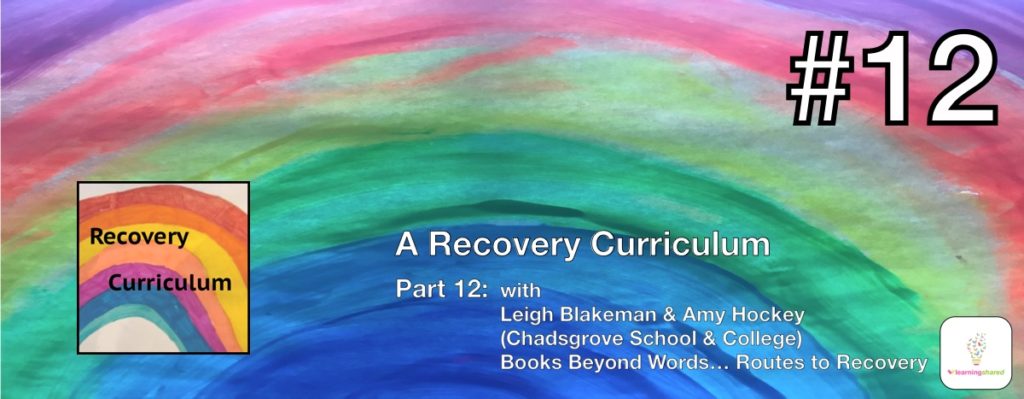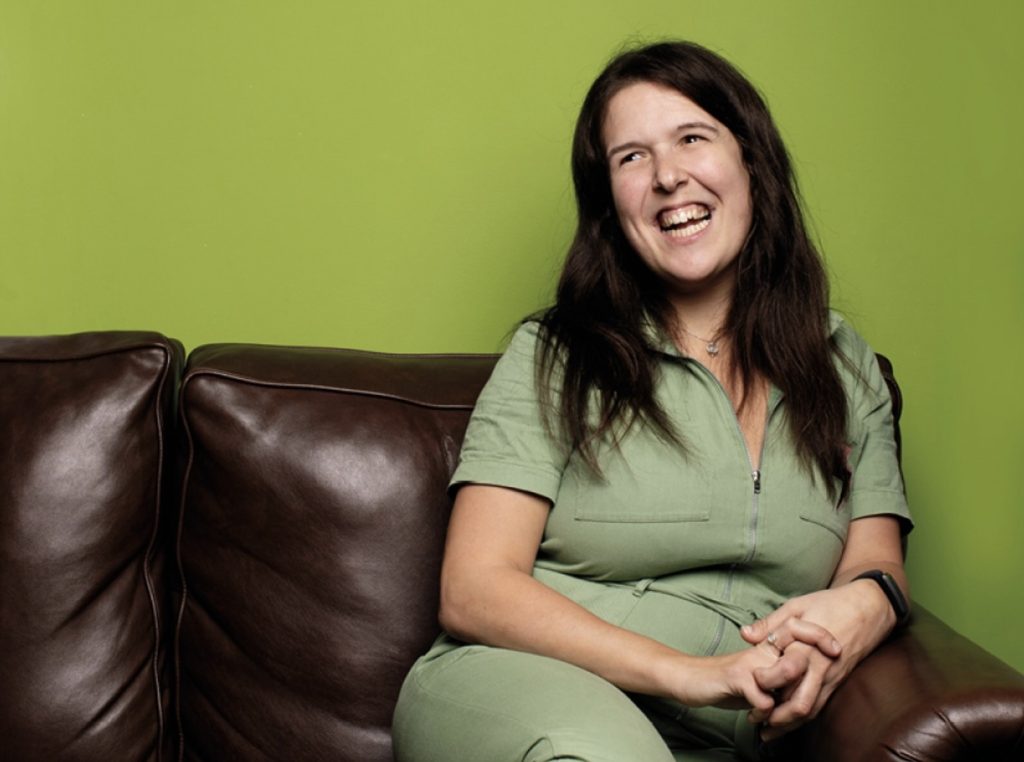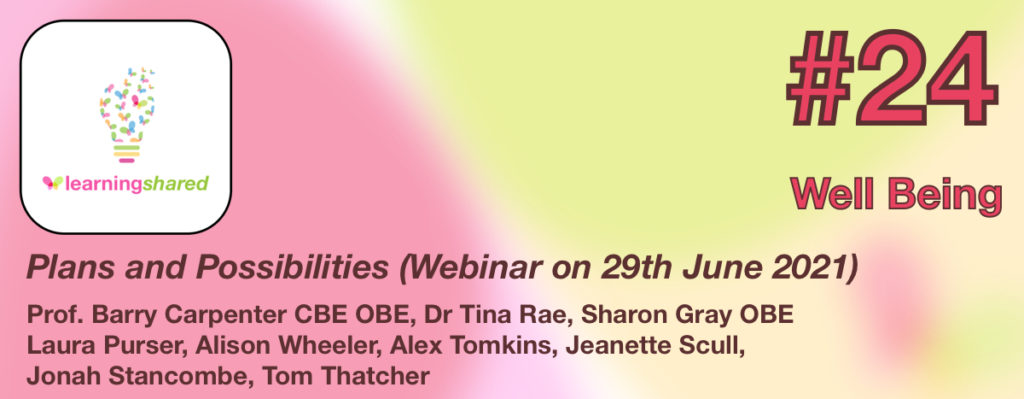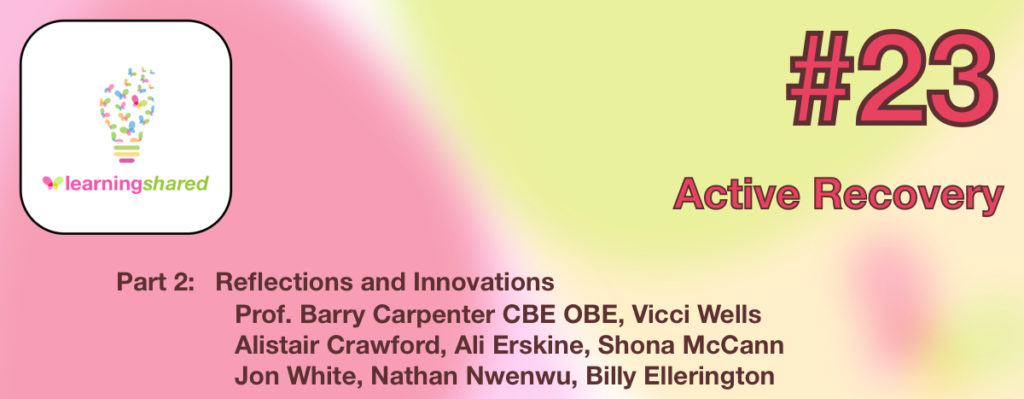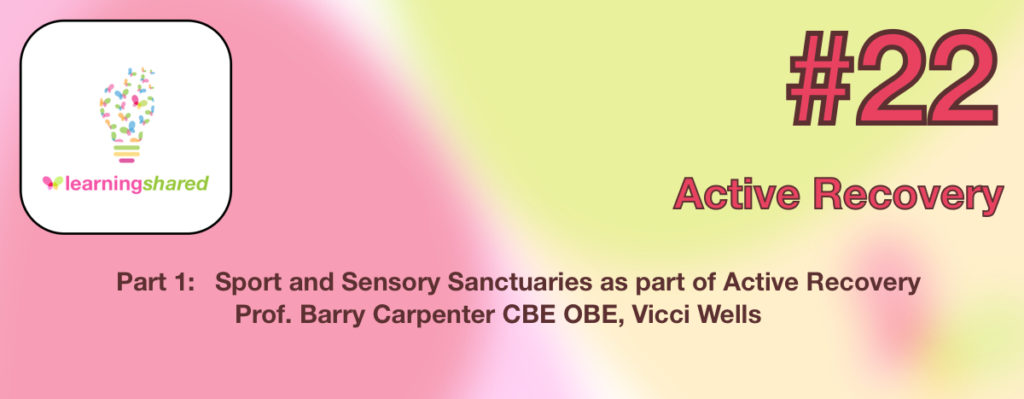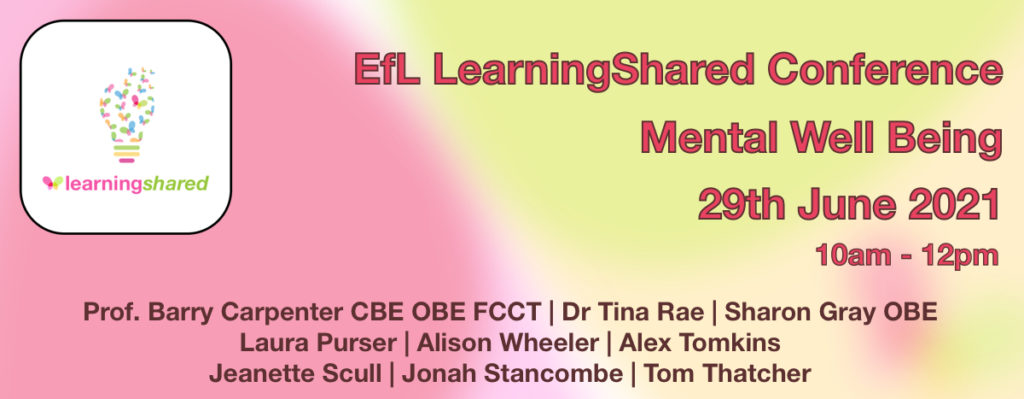This episode looking at resourcing a Recovery Curriculum, draws on a school-based inquiry project, the Open Book, that ran over 2 years and concluded at the beginning of 2020. It reports the development work and outcomes of the project which was from the national charity, Books Beyond Words.
The Project was led by Jo Egerton, (Schools Research Consultant), and directed by Professor Barry Carpenter.
Leigh Blakeman, Tutor, Chadsgrove College, and Amy Hockey, Teacher, Chadsgrove School in Bromsgrove, Worcestershire, review the value of these wordless books for the emotional development of their students and pupils.
The Project concluded its 2 year evaluation trial in the opening weeks of the pandemic, and Leigh and Amy apply their findings in the Project to the new context their learners will find themselves in, and how they can explore a range of feelings and losses outlined in the Recovery Curriculum Think Piece.
Using the Book Club model they discuss its effectiveness and value for social interaction. Leigh has, via zoom, re created this experience for some of her students, involving parents/ carers too. They specifically discuss the use of the free downloadable booklet from www.booksbeyondwords.co.uk, ‘ Beating the Virus”, and how it has enabled their learners to explore their lived experience, during the pandemic, though open and honest conversations, (some of which we will be through alternative and augmentative forms of communication.)
The rich insights shared in this episode, from two outstanding practitioners, show how routes to recovery can be constructed that are personalised to student / pupil needs, using the Books Beyond Words resources.
The title and theme of the presentation is:
“Routes to Recovery through Books Beyond Words“
The video below contains the audio from LearningShared Episode 9 with visual slides from the presentation.
Examples of Books Beyond Words in Action!
Case Study 1
This video is of a zoom session with two students who attend Chadsgrove College . They are familiar with the Books Beyond Words series and regularly attend ‘Book Club’ as a part of their curriculum. Here they are in a smaller than usual group, to accommodate one students’ anxiety that has developed around Zoom calls.
Initially the approach was to work 1-1 (2 staff -1 for safeguarding purposes) with JW (Learner) to encourage a re-establishment of connection with college and in the hope that he would build over time to working with another student; this in turn paving the way towards re-building a friendship with a peer. JW enjoyed the first zoom session with Books Beyond Words so much that his self confidence was boosted and he agreed to have a fellow student join him the following week.
This video comprises of clips from that session where the two students demonstrate perfectly the Book Club model of turn taking, sharing ideas, listening to each other and showing mutual support. Both students use visual literacy skills, along with their own visual interpretation of the text; you will see this is supported through a total communication approach using Signalong sign language. This is a new title from Books Beyond Words, that has been especially commissioned as a downloadable resource in response to the covid -19 pandemic. This is not a text the two students are familiar with. Important to note is JW recognises the character as one from a previous book he has worked through called Belonging; he demonstrates recognition, processing and use of this prior knowledge to make his own visual interpretation of the image.It is clear to see the delight he expresses at his own achievement. CH (Learner) excels at the story telling abilities that Book Beyond Words texts empower her to do.
This particular text is an important resource to begin the open and honest conversations needing to take place, in order to gauge the levels of understanding and exposure young people have had within the covid-19 pandemic.
Case Study 2
This video is of a Books Beyond Words title ‘A Day at the Beach’. Again, this is a Zoom session demonstrating home-learning but this time, with a group of non verbal students with PMLD (profound and multiple learning disabilities).
This activity is part of a transition/link project between class members from Chadsgrove school and Chadsgrove College. This Books Beyond Words text allows for a fun activity that seeks to promote and re-establish friendships, one of the five losses identified by the recovery curriculum.
A sensory story approach is employed; parent carers encourage sensory interaction through the use of props relevant to the events of the story. A total Communication approach is encouraged using Signalong sign language and Story Massage to further enhance the levels of interaction. Through exploration of the stimuli, students demonstrate cognitive responses made possible through the opportunity to share in the journey of a Books Beyond Words story by appealing to senses beyond language alone.
We’ve listed below links to some of the references that Barry, Leigh and Amy make in the presentation.
Books Beyond Words
https://booksbeyondwords.co.uk
Further Reading
Book clubs for people with ID (Hollins, Egerton, Carpenter, 2016)
Sheila Hollins, Jo Egerton, Barry Carpenter, (2016) “Book clubs for people with intellectual disabilities: the evidence and impact on wellbeing and community participation of reading wordless books”, Advances in Mental Health and Intellectual Disabilities, Vol. 10 Issue: 5, pp.275-283, doi: 10.1108/AMHID-08-2016-0020
Nasen Connect Article (referred to in this episode)
Supporting Children with Wordless Books (PDF Copy)
Beyond Words Summer 2020 Newsletter
Books Beyond Words Summer 2020 Newsletter (PDF Copy)
Inquiring Minds Article (referred to in this episode)
Mental Wealth Journals article in SEND magazine – Bev Cockbill & Jo Egerton (PDF Copy)
Butterfly Print Journals
https://www.butterflyprint.co.uk
Chadsgrove School
https://www.chadsgroveschool.org.uk/web
About Amy Hockey
Amy is a class teacher at Chadsgrove School in Worcestershire working predominantly across Key Stage 1, 2, and 3 and is now a phase leader for Key Stage 3. Amy trained through the School Direct program and is passionate about supporting trainee teachers and enjoys being a school direct mentor for Chadsgrove Teaching School. Amy is currently working towards a Masters in Education and has recently completed a Women in Leadership course.
In 2019 she participated in the connecting classrooms project lead by the British Council and had the opportunity to visit schools in Nairobi, Kenya as part of an exchange program.
In 2015, Amy was involved in the ‘Inquiring Minds’ Research project at Chadsgrove and more recently the ‘Open Book’ Research project. Both exploring the use of different resources to support pupils Social, Emotional and Mental Health.
In 2014 Amy had an article published in SEND magazine on the use of eye gaze technology in improving engagement.
About Leigh Blakeman
Leigh has a BA Hons in English language/literature and Drama, she worked as a corporate professional, first starting in educational practice in 1993 as an NVQ assessor. This led to further training as an FE tutor with a specialism in Holistic therapies, well-being practices and English.
Leigh has been at Chadsgrove School in Worcestershire for eight years, to begin as a part time holistic therapy tutor; she soon realised that education within the SEN sector was her primary focus.
Currently she is a tutor, based at Chadsgrove College. This is a specialist college provision for students aged between 19-25, that provides a tailored curriculum focused around the Preparing for Adulthood pathways for students with PMLD, severe learning disabilities and complex needs.
Barry Carpenter’s website
https://barrycarpentereducation.com
More info on the Recovery Curriculum
For information on the Recovery Curriculum, including the original Think Piece entitled “A Recovery Curriculum: Loss and Life for our children and schools post pandemic”, lectures, resources, reference materials and details of the online communities of practice, visit:
http://www.recoverycurriculum.org
Join the conversation about The Recovery Curriculum:
Clearly any form of Recovery Curriculum will need to be unique to each and every school, contextualised to the ethos, culture and values of that school, as well as its existing curriculum and crucially reflecting and addressing the needs and aspirations of its unique population of learners.
We have created private groups in LinkedIn and Facebook where colleagues and peers can discuss and share thoughts, ideas, experiences, resources and learning in relation to education and provision post pandemic. The groups are also an opportunity to connect people and help you to build a network that can support you on your own important journey over the coming months.
Facebook Group: Recovery Curriculum
We’ve set up a private facebook group specifically for The Recovery Curriculum at:
https://www.facebook.com/groups/recoverycurriculum
or search for “recoverycurriculum” in Facebook.
Facebook: EfL SEND Community Group
Join us at:
https://www.facebook.com/groups/eflSENDCommunity/
or search for “eflSENDCommunity” in Facebook.
The purpose of the group is to provide a safe, closed space to seek out and share ideas, experience and resources that can help with any and all aspects of SEND provision. It’s also a community for practitioners and schools that use Evidence for Learning and Insights for Learning to share ideas, resources and support each other in using these apps. This is a peer-moderated and supported group.
Linkedin Group: The Recovery Curriculum
The group is called “A Recovery Curriculum for children & schools post-pandemic” and you can find it at:
